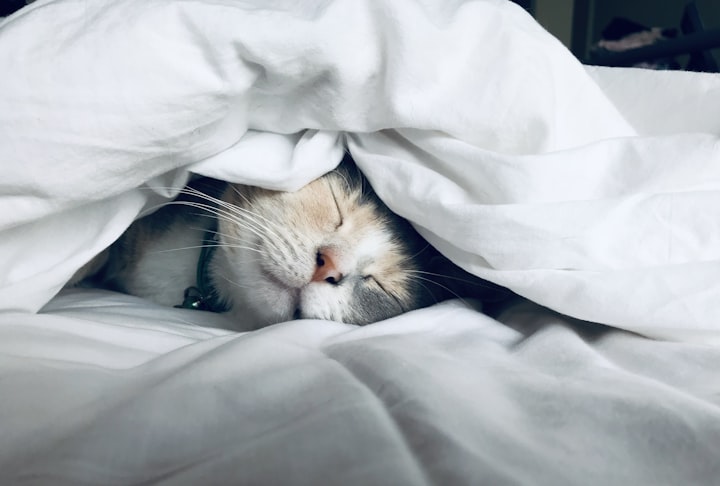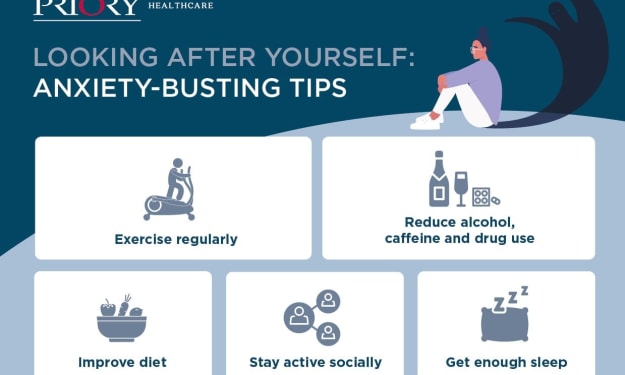
Getting a good night's sleep is essential for overall health and well-being. Here are some tips to help you sleep better:
Establish a consistent sleep schedule: Try to go to bed and wake up at the same time every day, even on weekends. This helps regulate your body's internal clock and improves sleep quality.
Create a relaxing bedtime routine: Engage in activities that promote relaxation before bed. This may include reading a book, taking a warm bath, practicing deep breathing exercises, or listening to calming music. Avoid stimulating activities or bright screens (such as phones or tablets) close to bedtime as they can interfere with sleep.
Make your bedroom sleep-friendly: Create a comfortable sleep environment by keeping your bedroom cool, dark, and quiet. Use earplugs, eye shades, or a white noise machine if necessary. Invest in a comfortable mattress, pillows, and bedding that suit your preferences.
Limit exposure to electronic devices before bed: The blue light emitted by electronic screens can disrupt your sleep patterns. Try to avoid using electronic devices at least an hour before bed. If you must use them, consider using apps or settings that reduce blue light emission.
Be mindful of your caffeine and alcohol intake: Avoid consuming caffeine (found in coffee, tea, chocolate, and some sodas) and alcohol close to bedtime. These substances can interfere with your ability to fall asleep and disrupt your sleep patterns.
Exercise regularly: Engaging in regular physical activity can promote better sleep. However, try to finish exercising at least a few hours before bedtime, as exercising too close to sleep can make it harder to fall asleep.
Manage stress: Stress and anxiety can greatly affect sleep quality. Develop healthy coping mechanisms to manage stress, such as practicing relaxation techniques, journaling, or engaging in activities you enjoy. If needed, consider talking to a therapist or counselor for additional support.
Create a comfortable sleeping environment: Ensure that your bedroom is well-ventilated, with a temperature that suits your preferences. Use comfortable bedding and pajamas that allow for proper airflow and body temperature regulation.
Avoid large meals and excessive fluid intake before bed: Eating a heavy meal or consuming excessive fluids before bedtime can lead to discomfort, indigestion, and frequent trips to the bathroom, which can disrupt your sleep.
Consider your sleep surroundings: If noise or light pollution is a problem in your area, consider using earplugs, a sleep mask, or white noise machines to create a more conducive sleep environment.
If you consistently have difficulty sleeping or suspect a sleep disorder, it's important to consult a healthcare professional for a comprehensive evaluation and appropriate guidance.Getting a good night's sleep is crucial for your overall health and well-being. Here are some tips to help you sleep better:
Stick to a sleep schedule: Try to go to bed and wake up at the same time every day, even on weekends. Consistency helps regulate your body's internal clock.
Create a bedtime routine: Establish a relaxing routine before bed to signal to your body that it's time to wind down. This could include activities such as reading a book, taking a warm bath, or practicing relaxation techniques like deep breathing or meditation.
Create a sleep-friendly environment: Make sure your bedroom is conducive to sleep. Keep it cool, quiet, and dark. Consider using earplugs, an eye mask, or white noise machines to block out any disruptive sounds or light.
Limit exposure to screens before bed: The blue light emitted by electronic devices such as smartphones, tablets, and computers can interfere with your sleep. Avoid using these devices at least an hour before bed. Instead, engage in relaxing activities like reading a book or listening to calming music.
Be mindful of your caffeine and alcohol intake: Caffeine is a stimulant that can interfere with your sleep, so it's best to limit your consumption, especially in the afternoon and evening. Similarly, while alcohol may make you feel drowsy initially, it can disrupt your sleep later in the night.
Exercise regularly: Engaging in regular physical activity can help you sleep better. However, try to avoid vigorous exercise close to bedtime, as it can make it harder for you to fall asleep. Aim to finish your workout at least a few hours before bed.
Manage stress: High levels of stress can make it difficult to fall asleep and stay asleep. Practice stress-reducing techniques such as relaxation exercises, journaling, or engaging in activities you enjoy. If you find that stress or anxiety is significantly impacting your sleep, consider seeking professional help.
Watch your diet: Avoid heavy meals close to bedtime, as they can cause discomfort and indigestion. Additionally, certain foods can promote better sleep, such as those rich in tryptophan (e.g., turkey, nuts, seeds) and magnesium (e.g., spinach, almonds, bananas). A balanced diet can positively impact your sleep quality.
Avoid napping late in the day: If you're having trouble sleeping at night, it's best to avoid daytime napping or limit it to a short power nap in the early afternoon. Napping too close to bedtime can disrupt your natural sleep patterns.
Consider your sleep environment: Invest in a comfortable mattress, supportive pillows, and breathable bedding. If you have specific sleep issues like snoring or sleep apnea, consult a healthcare professional for appropriate guidance.
If you continue to experience persistent sleep problems, it's advisable to consult a healthcare professional or a sleep specialist who can provide personalized guidance and solutions based on your individual needs.
About the Creator
Abdullah hameed
Hey, its Abdullah Hameed.
In my page you will find blogs on many topics. Which will help to increase your Knowledge.






Comments
There are no comments for this story
Be the first to respond and start the conversation.